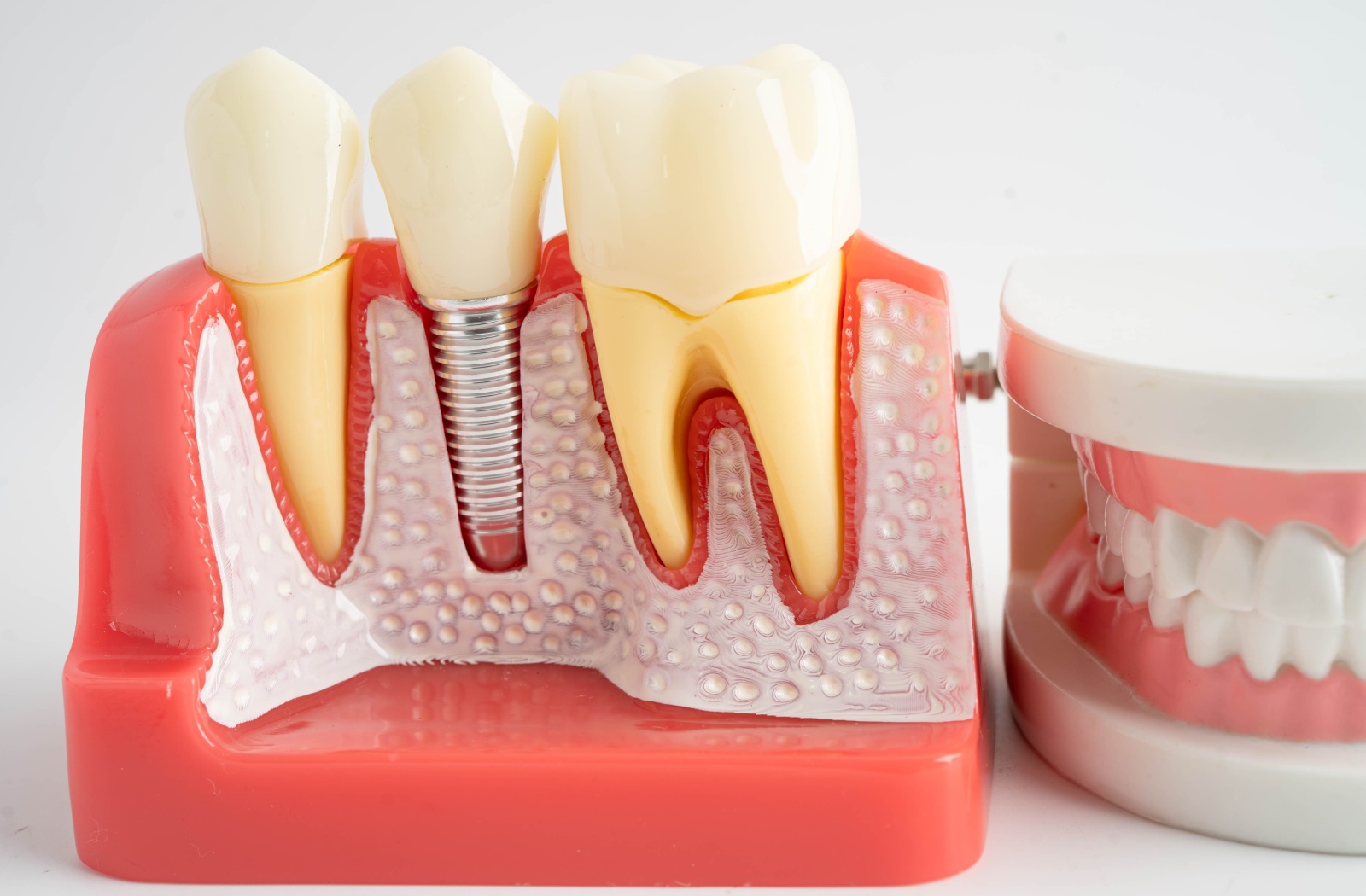Dental implants represent one of modern dentistry’s most effective solutions for replacing missing teeth. They provide a stable, natural-looking alternative that can drastically improve daily life by restoring both functionality and appearance.
The dental implant process involves a series of steps, including:
- An initial consultation
- Treatment planning
- Implant placement surgery
- Healing and osseointegration
- Abutment and crown placement
Whether you’re replacing a single tooth or several, your dentist is here to help you feel confident and prepared for your treatment.
The Types of Dental Implants
Dental implants are an innovative solution designed to replace missing teeth. This procedure involves securing an artificial tooth root, made of biocompatible materials, directly into your jawbone. Once placed, implants provide a sturdy foundation for attaching custom-made crowns or bridges that seamlessly blend with your natural teeth.
There are a few different types of dental implants to fit your unique needs. They include:
- Single tooth implants: Ideal for replacing one missing tooth with a custom crown for natural integration.
- Implant-supported dentures: A stable alternative to traditional dentures, providing enhanced comfort and security.
- All-on-4 implants: A minimally invasive option to support a full arch of teeth with just 4 implants.
No matter what type of dental implant you choose, the process is mostly the same.
Step-by-Step Guide to the Dental Implant Process
Initial Consultation & Evaluation
The first step in the dental implant process is a thorough consultation with your dentist. This critical visit allows the dentist to assess your overall oral health and determine if you’re a candidate for dental implants. X-rays, CBCT scans, and impressions of your teeth and jaw may be taken to get a detailed look at your bone structure and oral anatomy.
This is also the time when your dentist checks for factors like gum health, jawbone density, and medical history to be confident that the implants will integrate successfully. The goal is to make sure your mouth is ready to support implants for long-term success.
Treatment Planning
After the initial evaluation, your dentist will create a personalized treatment plan tailored to your needs. This plan includes the timeline of the procedure, the associated costs, and which type of implant is best suited for you.
Different types of implants, such as single-tooth implants, multiple-tooth implants, or even full-arch implant-supported dentures, may be discussed. This phase carefully considers both your goals and the physical requirements for the placement. It can include X-rays or other forms of imaging. Having a clear roadmap at this stage helps set expectations and aligns the process with your needs.

Implant Placement Surgery
The next step is the placement of the implant itself. During this procedure, a titanium post is surgically placed into your jawbone to act as a root for the replacement tooth. Local anesthesia is always used, and sedation options are available for added comfort during the procedure.
Recovery from the surgery may involve some minor swelling, discomfort, or tenderness, but these symptoms are manageable and typically subside in a few days. Following your dentist’s post-operative care instructions will help this phase go smoothly.
Healing & Osseointegration
Osseointegration is a crucial phase of the dental implant process. This is when the implant fuses with the jawbone, creating a strong, lasting foundation for your replacement tooth.
This period usually takes a few months, and while it requires patience, it’s an essential step. During this time, you’ll be advised to avoid certain foods and habits that could interfere with healing. Regular check-ins with your dentist will confirm that everything is progressing as planned.
Abutment & Crown Placement
Once the implant has successfully fused with your jawbone, an abutment is placed on top of it. The abutment is a small connector that holds your new crown firmly in place.
Placing the abutment is a straightforward procedure that’s done under local anesthesia. Some minor soreness or swelling may occur, but it’s typically short-lived. This step is vital as it helps your replacement tooth sit securely and function like a natural tooth.
With the abutment in place, the final step is creating and placing the crown. This crown is custom-made to match the shape, size, and colour of your natural teeth for a seamless look. Once ready, the crown is securely attached to the abutment, completing the process.
Why Choose Dental Implants?
The benefits of dental implants go well beyond their natural appearance, including:
- Longevity: With proper care, implants can last a lifetime, though their crown may need to be replaced in about 20 years.
- Improved function: They can restore full chewing capabilities, making it easier to enjoy your favourite foods.
- Bone health: Implants can prevent bone loss by stimulating the jawbone and preserving your facial structure.
Additionally, advancements in dental technology have made dental implant procedures safer, more efficient, and more comfortable than before.
Post-Op Care & Maintenance
After your dental implant procedure, maintaining your smile becomes a top priority. Caring for your implants is similar to caring for your natural teeth.
Dental implants are an investment, and maintaining them properly helps them continue to serve you well. Here are some tips you can follow:
- Practice excellent oral hygiene: Brush and floss daily, just as you would with natural teeth.
- Avoid harmful habits: Minimize smoking or teeth grinding, which can compromise implant stability.
- Regular dental visits: Routine check-ups are essential to monitor your implant health and address any issues early.
Your dentist may also recommend specific tools like water flossers or soft-bristled brushes to make cleaning even easier.
Your Journey to a Confident Smile Starts Now
At Ti Dental, we’re passionate about making each step of the dental implant process as smooth and comfortable as possible. Whether you’re just starting to consider dental implants or ready to book your initial consultation, our team is here to guide you from start to finish.
Contact us today to schedule your consultation and take the first step toward a healthier, more confident smile!








